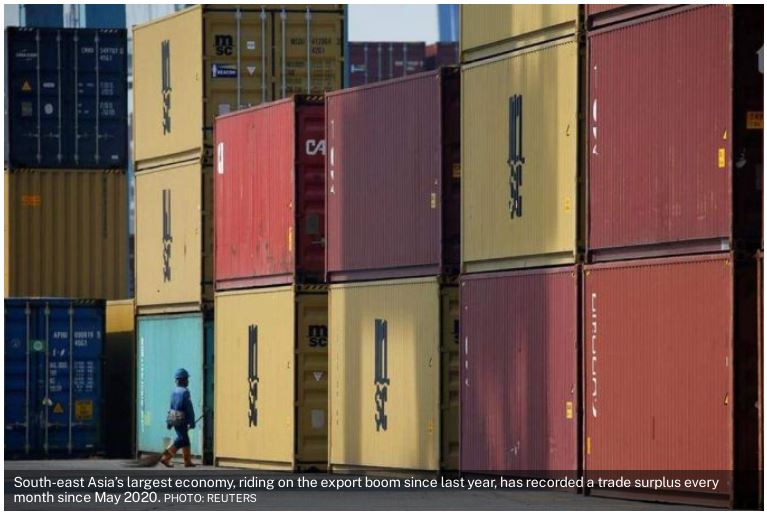Indonesia warns of export slowdown after July trade surplus beats forecast
INDONESIA’S windfall export earnings thanks to high commodity prices may start dwindling, its statistics bureau warned on Monday (Aug 15), despite the country booking a larger-than-expected surplus in July.
The resource-rich nation booked a US$4.2 billion surplus last month as it enjoyed the impact of high commodity prices globally, although prices of some of its main products like palm oil, nickel, and natural gas have declined.
July’s trade surplus is bigger compared with Reuters’ poll projection of US$3.93 billion. June’s surplus was US$5.09 billion.
South-east Asia’s largest economy, riding on the export boom since last year, has recorded a trade surplus every month since May 2020. That has helped boost its recovery from the impact of the pandemic and reduced pressure on the rupiah currency amid a strong US dollar.
However, Statistics Indonesia has now warned the nation’s export gains have largely been a reflection of rising prices, while export volumes have remained relatively stagnant.
“The impressive growth of exports in January-July of 2022 was driven by a rise in commodity prices,” said Setianto, deputy head of the bureau.
“This windfall could end if commodity prices return to normal. Because export volumes of our main commodities tend to be stagnant, this may be something that we need to pay attention to in regards to our exports in coming months,” he added.
July’s exports were up 32.03 per cent on a yearly basis to US$25.57 billion, compared with the poll’s 29.73 per cent growth forecast.
On a monthly basis, shipments of steel, tin and nickel fell.
Meanwhile, imports rose 39.86 per cent to US$21.35 billion, compared with an increase of 37.3 per cent expected in the poll.
Statistics Indonesia also warned of the impact on trade of rising tensions in the Taiwan Strait, as China is Indonesia’s biggest trade partner.
Wisnu Wardana, an economist with Bank Danamon, predicted the trade surplus would continue to narrow for the remainder of 2022, which would mean less support for foreign exchange reserves.
“A weakening first line of defense would increase pressure for Bank Indonesia to adjust its policy rate when external pressure intensifies,” he said, adding that the central bank would probably still keep interest rate unchanged at its next policy meeting on Aug 22-23. REUTERS


 English
English




